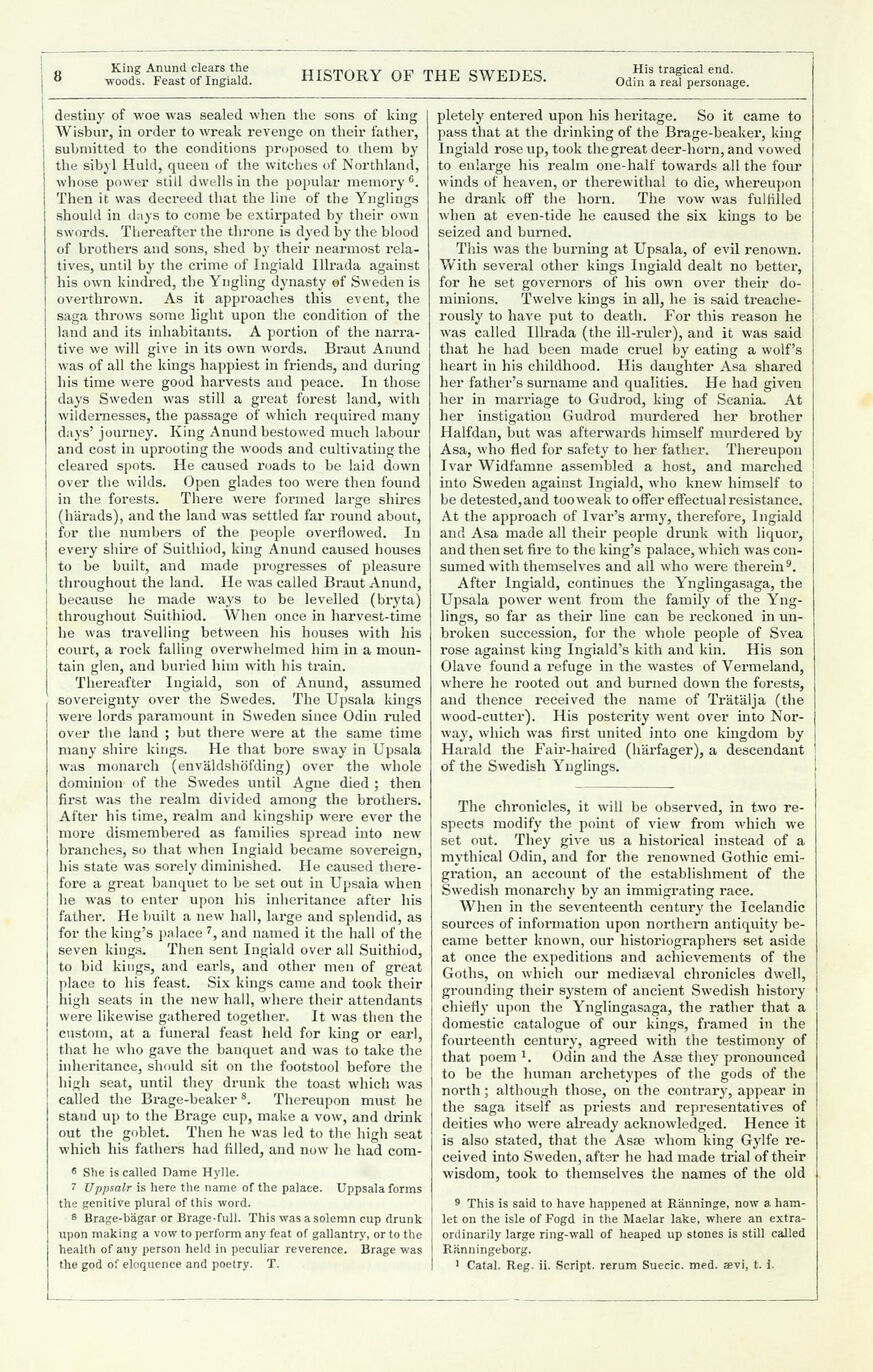
Full resolution (JPEG) - On this page / på denna sida - I. Traditions of the North

<< prev. page << föreg. sida << >> nästa sida >> next page >>
Below is the raw OCR text
from the above scanned image.
Do you see an error? Proofread the page now!
Här nedan syns maskintolkade texten från faksimilbilden ovan.
Ser du något fel? Korrekturläs sidan nu!
This page has been proofread at least once.
(diff)
(history)
Denna sida har korrekturlästs minst en gång.
(skillnad)
(historik)
destiny of woe was sealed when the sons of king
Wisbur, in order to wreak revenge on their father,
submitted to the conditions proposed to them by
the sibyl Huld, queen of the witches of Northland,
whose power still dwells in the popular memory [1].
Then it was decreed that the line of the Ynglings
should in days to come be extirpated by their own
swords. Thereafter the throne is dyed by the blood
of brothers and sons, shed by their nearmost
relatives, until by the crime of Ingiald Illrada against
his own kindred, the Yngling dynasty of Sweden is
overthrown. As it approaches this event, the
saga throws some light upon the condition of the
land and its inhabitants. A portion of the narrative
we will give in its own words. Braut Anund
was of all the kings happiest in friends, and during
his time were good harvests and peace. In those
days Sweden was still a great forest land, with
wildernesses, the passage of which required many
days’ journey. King Anund bestowed much labour
and cost in uprooting the woods and cultivating the
cleared spots. He caused roads to be laid down
over the wilds. Open glades too were then found
in the forests. There were formed large shires
(härads), and the land was settled far round about,
for the numbers of the people overflowed. In
every shire of Suithiod, king Anund caused houses
to be built, and made progresses of pleasure
throughout the land. He was called Braut Anund,
because he made ways to be levelled (bryta)
throughout Suithiod. When once in harvest-time
he was travelling between his houses with his
court, a rock falling overwhelmed him in a
mountain glen, and buried him with his train.
Thereafter Ingiald, son of Anund, assumed
sovereignty over the Swedes. The Upsala kings
were lords paramount in Sweden since Odin ruled
over the land; but there were at the same time
many shire kings. He that bore sway in Upsala
was monarch (enväldshöfding) over the whole
dominion of the Swedes until Agne died; then
first was the realm divided among the brothers.
After his time, realm and kingship were ever the
more dismembered as families spread into new
branches, so that when Ingiald became sovereign,
his state was sorely diminished. He caused
therefore a great banquet to be set out in Upsala when
he was to enter upon his inheritance after his
father. He built a new hall, large and splendid, as
for the king’s palace [2], and named it the hall of the
seven kings. Then sent Ingiald over all Suithiod,
to bid kings, and earls, and other men of great
place to his feast. Six kings came and took their
high seats in the new hall, where their attendants
were likewise gathered together. It was then the
custom, at a funeral feast held for king or earl,
that he who gave the banquet and was to take the
inheritance, should sit on the footstool before the
high seat, until they drunk the toast which was
called the Brage-beaker [3]. Thereupon must he
stand up to the Brage cup, make a vow, and drink
out the goblet. Then he was led to the high seat
which his fathers had filled, and now he had
completely entered upon his heritage. So it came to
pass that at the drinking of the Brage-beaker, king
Ingiald rose up, took the great deer-horn, and vowed
to enlarge his realm one-half towards all the four
winds of heaven, or therewithal to die, whereupon
he drank off the horn. The vow was fulfilled
when at even-tide he caused the six kings to be
seized and burned.
This was the burning at Upsala, of evil renown.
With several other kings Ingiald dealt no better,
for he set governors of his own over their
dominions. Twelve kings in all, he is said
treacherously to have put to death. For this reason he
was called Illrada (the ill-ruler), and it was said
that he had been made cruel by eating a wolf’s
heart in his childhood. His daughter Asa shared
her father’s surname and qualities. He had given
her in marriage to Gudrod, king of Scania. At
her instigation Gudrod murdered her brother
Halfdan, but was afterwards himself murdered by
Asa, who fled for safety to her father. Thereupon
Ivar Widfamne assembled a host, and marched
into Sweden against Ingiald, who knew himself to
be detested, and too weak to offer effectual resistance.
At the approach of Ivar’s army, therefore, Ingiald
and Asa made all their people drunk with liquor,
and then set fire to the king’s palace, which was
consumed with themselves and all who were therein [4].
After Ingiald, continues the Ynglingasaga, the
Upsala power went from the family of the Ynglings,
so far as their line can be reckoned in unbroken
succession, for the whole people of Svea
rose against king Ingiald’s kith and kin. His son
Olave found a refuge in the wastes of Vermeland,
where he rooted out and burned down the forests,
and thence received the name of Trätälja (the
wood-cutter). His posterity went over into
Norway, which was first united into one kingdom by
Harald the Fair-haired (härfager), a descendant
of the Swedish Ynglings.
<< prev. page << föreg. sida << >> nästa sida >> next page >>